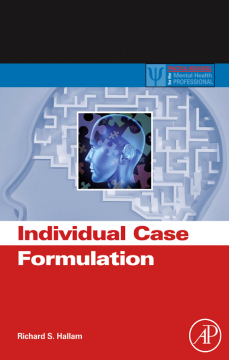
Additional Information
Book Details
Abstract
Individual Case Formulation presents formulation as a process that can be taught systematically to trainee therapists. The book begins by discussing assorted theories of case formulation, and critiques their ability to be applied in real world situations. The individual case formulation approach is then defined and discussed as a way to integrate the best of what different theoretical orientations have to offer in conjunction with the expertise and clinical judgment of the therapist. The book proposes a systemic/functional framework that focuses on difficulties as defined by the client and emphasizes constructive solutions to problems rather than symptom reduction. Moving from theory to application, the book then guides therapists in how to conduct assessment interviews, how to reach a provisional formulation, how to test that formulation for accuracy and reformulate if necessary, how a therapist can make explicit what their clinical reasoning was in making the case formulation, and provides case examples and transcripts so readers will better grasp the concepts in action.
Intended both for the starting or trainee therapist and the experienced clinician, Individual Case Formulation provides a practical guide for those looking to improve their case formulation skills.
- Reviews, critiques and compares multiple theories on formulation
- Identifies benefits of utilizing the individual case approach
- Guides trainee therapists how to conduct assessment interviews and reach a provisional formulation
- Presents a conceptual framework for developing and testing a formulation
- Helps trainees make explicit their clinical reasoning
- Field-tested for several decades
- Provides case examples with annotated transcripts to illustrate the process of formulation
"Hallam…advocates for good individual case formulation (ICF) as a key element of therapeutic success, and views case formulation as drawing upon expert methodological knowledge as well as craft skills of an interpersonal nature. After reviewing conceptual frameworks for case formulation, the author introduces reasoning processes for ensuring ICF is not purely subjective and conventions for producing a functional case formulation diagram." --Reference and Research Book News, December 2013
"…this thought provoking book provides a timely review of both conceptual bases of ICF and an examination of current assumptions underlying ICF in the light of modern pressures to put people’s psychological problems and complexities in to over simple categories, such as medical diagnoses… This is a book that should be a major reference text in all clinical and counselling psychology courses…" --Clinical Psychologist, August 2013
"Richard Hallam, in a significant contribution to the understanding of this topic, presents us with both a scholarly and reflective review about the nature of Individual Case Formulation (ICF) in contemporary psychotherapy, and, also with a practical guide (well illustrated with case material) about how it may be further developed.
...this thought provoking book provides a timely review of both conceptual bases of ICF and an examination of current assumptions underlying ICF in the light of modern pressures to put people’s psychological problems and complexities in to over simple categories, such as medical diagnoses.
This is a book that should be a major reference text in all clinical and counselling psychology courses but, it is also a thought provoking volume to read for the established practitioner (or clinician)." --David J. de L. Horne, Clinical Psychologist
